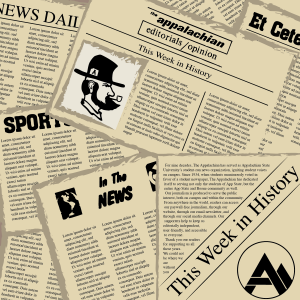Opinion: Nationalism is Dangerous
October 16, 2020
Standing up to say the Pledge of Allegiance every morning in grade school is normal to Americans. We’ve repeated it so many times, the pledge has become a force of habit and we don’t give much thought. But, if we take a moment to think about it, the pledge represents an alarming tradition of nationalism in the United States.
Nationalism is dangerous. There is nothing wrong with being patriotic, but Americans often forget, or may not even be aware of, how quickly enthusiastic patriotism can devolve into nationalism. Patriotism and nationalism are often used interchangeably, but they are very different. Patriotism is love and pride for one’s nation, while nationalism is the idea of superiority of one’s culture, government, people and nation over others.
Nationalism has a disturbing history in our country. It is ingrained in American culture that our nation is the best in the world. In President Trump’s Fourth of July speech this year, he praised the American Republic “as the greatest, most exceptional, and most virtuous nation in the history of the world.”
Nationalist ideology begins in schools. Aside from repeating the pledge every morning, nationalism is fixed in public school curriculums. In history class, America is portrayed as the “good guy” that’s always on the right side of history. History curriculums often conveniently leave out the not so appealing parts of American history where our country wasn’t on the “right side.” For example, the full truth about slavery, the destruction of Native American nations and culture, the American military’s actions in Vietnam and the annexation of Hawaii. Dismissing our country’s difficult history to preserve a false nationalistic perspective of greatness is not a mark of a great nation.
Another characteristic of nationalism is its use as a tool during wartime to gain popular support. This is most prominently seen in the U.S. during World War II. American nationalism came into its own during the years of and following World War II. George Orwell states in his 1945 essay “Notes on Nationalism” defines nationalism “as the habit of assuming that human beings can be classified like insects and that whole blocks of millions or tens of millions of people can be confidently labeled ‘good’ or ‘bad.’” Nationalist propaganda, especially during the Cold War, characterized the “ideal” American family as white, Protestant, conservative and upper-middle class. Singling out the American nationality as superior and more righteous than our opponents makes our actions abroad justified and easier to accept.
But, the U.S. isn’t all white, Protestant, conservative and upper-middle class. Nationalism alienates Americans who don’t fit this mold. As a country, we have lost our American values: liberty and equality. Our country is diverse, and we should be proud of that. America has to face and fight against nationalism. Ignoring our difficult history and claiming greatness is not how our country will grow. Criticism is good. Acknowledging our faults and confronting our past is the most patriotic action Americans can take.














Chris • Mar 13, 2023 at 11:24 am
Nationalism isn’t bad. Defining our ideal class of people and ignoring our losses and bad deeds does not have to be part of nationalism. The parts that I would take to be the most positive is having a proud outlook of your country, not ignoring the bad, but also not dwelling on it either, and putting the needs of our citizens and our country above giving tax money to other countries. Also I believe nationalists believe in strong borders, which this country desperately needs. The opposite of nationalism is letting everyone walk all over you. i.e Biden, and before you start pulling the Trump comebacks, I don’t like him either, so keep it to yourself. If Trump did have any redeeming quality though it was batting for America and not for the other team.
Terry malone • Mar 1, 2023 at 4:51 pm
As long as people believe their country is better because of whatever, there will always be war. Wars will end when people refuse to kill one another anymore and just be happy about living, I know..sounds crazy but its true
Taylor • Jun 15, 2022 at 10:22 am
I still don’t understand the difference between the two. Your saying it’s good to be patriotic and proud of your country. But it’s bad to be a nationalist and think your country is better than any other countries. Just because your country did screwed up things. If you can’t be a nationalist for that reason then how could you be patriotic?
Dulla • Feb 13, 2022 at 12:12 am
Notwithstanding the other issues of the article, like the general farcical public discourse in the United States there seems to be a fundamental misunderstanding of what nationalism is. Nationalism at its core has nothing to do with pride or positive feeling towards a nation one perceives oneself as belonging to. Rather, nationalism would be more accurately described as the very identification of the individual with the concept of a “nation,” a uniquely modern abstraction engineered by governments holding increasingly centralized and consolidated power in the industrial era in order to mobilize their subjects and ensure continued submission on their part by tying up their allegiance to the state in their fundamental identity of self, whereas in all prior periods of history such a concept was nonsensical and allegiances lied variously with more direct ties of kinship, religion, local fiefdoms, etc. By assigning collective guilt to yourself and all other American citizens for some things that people you probably aren’t even related to did hundreds of years ago that were more mild-mannered than what went on in almost every other part of the world at the same time, you are not rejecting anything of the fundamentals of nationalism.
RPD • Oct 13, 2022 at 6:24 am
“identification with one’s own nation and support for its interests, especially to the exclusion or detriment of the interests of other nations.”
the belief that others are less deserving, or something less than is dangerous. All people’s have the same rights, needs, and desire to access a rapidly dwindling set of resources.
Nations are imaginary, and especially in the context of humanity, identifying one’s self with imaginary interests is dangerous.
David Clayton • Aug 9, 2021 at 1:17 am
I guess no other country has skeletons in it’s closet, huh? How about colonial powers like Britain, France, and Spain to name just a few???
If you don’t take pride in your country and it’s history (not even the Pledge of Allegiance??), maybe emigrate elsewhere.
Love it or leave it,
David Clayton
Charlotte NC
ASU class of 1981
myr • Jan 12, 2022 at 2:07 pm
did u even read the article lol
Viv • Jan 28, 2022 at 1:56 pm
bro no. fr tho… did u even read the article? seems not, nationalism has down sides and the author clearly portrays this. there would be no diversity, its alr to take pride in our country, ect. but there are some downsides.
Samara Winston • Feb 27, 2021 at 7:03 am
I appreciate and value your opinion and am delighted at the variety of responses to your commentary. I think 2 things need to happen to help create a true pride in our country: (1) a diverse teaching of accurate & honest history in our schools – e.g. 1921 Tulsa OK race massacre, Native American history, forced internment of Germans, Japanese & Italians in WWII. (2) in schools, Teach & require the same Civics knowledge we ask of immigrants to become U.S. citizens.
Our country didn’t exit before 1776. We’re a young country built by being diverse. Rather than elevate or BLAME anyone group, we need to celebrate all. No one person or idea is any more important than any one group or thought. Diversity in opinion is absolutely essential for everyone. What is equally important is showing dignity and respect for diversity and differences.
And lastly- we need to stop referring to races- there’s only ONE RACE- human.
McCall • Jan 29, 2021 at 1:17 pm
Now more than ever Americans need to know the difference between patriotism and nationalism, and this article perfectly separates the two!!
McCall • Jan 29, 2021 at 1:15 pm
now more than ever Americans need to know the difference between patriotism and nationalism, and this article perfectly separates the two!
Student • Jan 28, 2021 at 10:50 pm
This is a great article! Very informative! The author obviously did her research, and she makes an excellent point. The distinction between patriotism & nationalism is very important & I’m glad she brought it up.
Nimra • Jan 28, 2021 at 10:50 pm
This is a fantastic article. We definitely need to have a lot more conversation surrounding the dangers of nationalism in this country. Xenophobia, genocides, and cultural cleansing cannot and must not be justified by “national pride.” Very happy to see that you’re covering this — keep up the fantastic work!
Skyboy • Jan 22, 2021 at 9:01 pm
No, we are not rewriting history. The most popular presidents in our history were Nationalist. It’s not a dirty word and we won’t let you make it one.
Colin Kap • Jan 15, 2021 at 2:28 pm
Your opinion would be valid if you didn’t create your own definitions.
Kan • Jan 7, 2021 at 6:56 pm
I can tell you aren’t from Appalachia. You are either some Yankee or some flatlander. Either way you are some entitled jackass who believes in your own intellectual superiority.
Elvis G. • Nov 13, 2020 at 7:53 pm
My American ancestors were not racists or bigots. Modern Americans who cannot allow their fellow Americans to celebrate their ancestors are truly the bigots and oppressors of freedom. Americans who cannot simply leave the other Americans in peace, to believe as they will, and speak without harassment, are surely the real fascists. Those Americans who judge others by their skin color first and the content of their character last are surely the real racists. 72 million of my fellow Americans just said the same thing.
PePa • Oct 16, 2020 at 6:19 pm
Great article. Would love to see more. So happy to see you did your research.